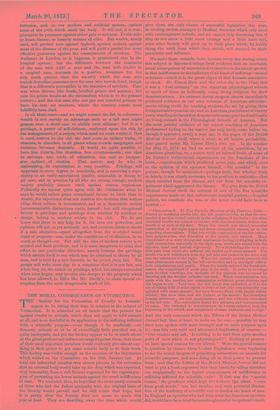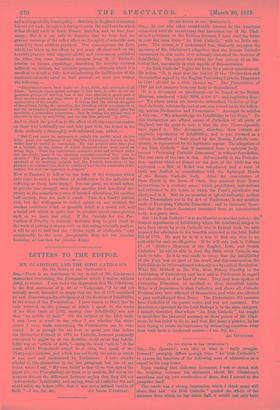"THE MORAL CONSEQUENCE OF VIVISECTION. T HESociety for the Prevention of
Cruelty to Animals'appear to be taking their time in relation to the subject of
Vivisection. It is admitted on all hands that the present law -against cruelty to animals, which does not apply to wild animals -at all, and is so doubtful in its application to the suffering inflicted with a scientific purpose—even though it be needlessly,—on -domestic animals as to be of exceedingly little practical use, is quite inadequate, and yet the Society appear to be so much afraid of the great professional influences ranged against them, that some of their most important members would evidently give almost any- thing in their power to get some outside body to do their work. This feeling was visible enough on the occasion of the deputation which waited on the Committee on the 25th January last. At least one influential member was almost piteous in his entreaties that an external body would take up the duty which was expected, very reasonably, from a rich Society organised for the express pur- _pose of protecting the lower animals against the cruel indifference of man. We ventured, then, to hope that the more manly counsels of those who had the fullest sympathy with the original basis of the Society would prevail, and we still retain that hope, but It is pretty clear the Society does not mean to move this year at least. They are dawdling away the time which would give them the only chance of successful legislation this year, in sending useless messages to Medical Societies which only meet with contemptuous rebuffs, and we cannot help foreseeing that if they do not show a little more courage and a little more zeal, some other Society will grow up in their place which, by boldly doing the work from which they shrink, will susceed to their popularity and influence. ,
We make these remarks here, because every day during which this subject is discussed brings fresh evidence that an inevitable moral consequence of unrestricted vivisection is the steady growth in that indifference to the infliction of all kinds of suffering—animal or human—which it is the great object of that humane association to check. Mr. Ernest Hart said the other day in the Times that it was a "foul calumny" on the American physiological schools to speak of them as habitually using living subjects for their demonstrations. An eminent dental surgeon almost immediately produced evidence in our own columns of American advertise- ments taking credit for teaching students the art by giving them livinganimals topractise on ; and an American practitioner of twenty years' standing declared that demonstrations are practised habitually on living animals in t4e Physiological Schools of America. But the most painful evidence of the seared condition of American professional feeling on the matter has only lately come before us, Aheugh it appeareclinearly yeir ago in Ahe pages, of, the British ,Medical Journal ,4kself, Where it must, in all human probability, have passed under Mr. Ernest Hart's own eye. In the uttsaber for May 23, ltVit, yeirfind an account of the sepetitiou; by an American physician, op a woman with an injured brain, of Some of Dr. Ferrier 's vivisecpional experiments on the functions of the brain,—experiments which produced acute pain, and wh4ileven in the opinion of the operator himself, "did mischief" to the patient, though lie maintained—perhaps truly, but whether truly or falsely, it was clearly necessary to his position to maintain—that death resulted from the disease, and not from the scientific ex- periment which aggravated the disease. We give, from the British Medical Journal itself, the account of one of the five scientific experiments made on this unfortunate hospital patient,—hospital patient, we conclude she was, or she never would have been so treated :— "Observation 3. To Test Faradic Reaction of the Posterior Lobes.— Passed an insulated needle into the left posterior lobe, so that the non- insulated portion rested entirely in the substance of the brain ; the other insulated needle was placed in contact with the dum mater, within one- fourth of an inch of the first. When the circuit was closed, muscular contraction of the right upper and lower extremities ensued, as in the preceding observations. Faint but visible contraction of the left orbien- laris palpebrarum, and dilatation of the pupils, also ensued. Mary complained of a very strong and unpleasant feeling of tingling in both right extremities, especially in the right arm, whioh she seized with the opposite hand and rubbed vigorously. Notwithstanding the very evi- dent pain from which she suffered, she smiled as if much amused. The needle was now withdrawn from the left lobe and passed in the same way into the substance of the right. When the current passed, precisely the same phenomena ensued in -the left extremities and in the right orbica- laris palpebrarum and pupils. When the needle entered the brainrsub- stance, she complained of acute pain in the neck. In order to develop more decided reactions, the strength of the current was increased by drawing out the wooden cylinder one inch. When communication was made with the needles, her countenance exhibited great distress, and she began to cry. Very soon the left hand was extended, as if in the act of taking hold of some object in front of her • the arm presently was agitated with °ionic spasms ; her eyes became dxed, with pupils widely dilated; lips were blue' and she frothed at the mouth; her breathing became stertorous; she lost censcionsness, and was violently convulsed on the left side. The convulsion lasted five minutes, and was succeeded by coma. She returned to consciousness in twenty minutes from the beginning of the attack, and complained of some weakness and vertigo."
And the only comment which the Editor of the British Medical Journal had, then at least, to make on the case,--possibly he may since have spoken with more strength and to more purpose upon it,—was this very mild and attenuated implication of censure :— " Our readers may ask, 'Is nothing to be said from quite another poiht of view which is not Physiological?' Nothing at present : we have special reasons for our silence." Were the special reasons in question by chance these ?—that Englishmen were beginning to see the moral dangers of permitting vivisections on animals for scientific purposes, and were doing all in their power to prevent them ; and that the Editor of the British Medical Journal did not Want to put a fresh argument into their hands by calling attention too emphatically to the logical consequences of indifference to suffering inflicted for scientific ends? If that was the "special reason," the prudence which kept the writer's lips silent, "even from good words," was but another and very powerful illustra- tion of the tendency of scientific zeal to harden the heart of man. In England an operator who had done what the American operator did, would have been tried for manslaughter after his patient's death,
and not improbably found guilty. But then in England vivisection has not yet made, though it is trying to make, the rapid strides which
it has already made in Italy, France, America, and, we fear, Ger- many. But it is not only in America that we have had the gravest warnings of the reflex effect on the spirit of scientific men caused by these reckless practices. Our contemporary the Echo, which has taken up the effort to put some effectual curb on this horrible practice with singular ability and earnestness, published the other day some translated extracts from M. J. B6clard's treatise on human physiology, describing the horrible tortures inflicted on animals for scientific purposes,—tortures which it is needless to detail in full ; but as indicating the indifference of the hardened scientific mind to their amount, we must just extract
the following
"Experiments have been made on frogs, birds, and mammals of all kinds. Animals whose spinal marrow is laid bare, in order to cut the posterior groups (of nerves), lose, it has been objected a great part of their sensitiveness, and thus there is a great uncertainty in the exact
appreciation of the results. It is true that the violent struggles of the animal during the operation, the bleeding which accompanies it, and the involuntary contusions of the exposed part, entail, after the operation, a momentary exhaustion. But by letting the animal rest, it recovers in time its sensibility, and one can then proceed." (p. 1055.)
And to clinch the proof as to the effect of all this experimentation on those who habitually see and take part in it, the writer in the Echo, evidently a thoroughly well-informed man, added :— "But if yet more be necessary to satisfy the public mind on this latter point, the testimony of an English physiologist, known to the writer may be useful in conclusion. He was present some time past at a lecture, in the course of which demonstrations were made on living doge. When the unfortunate creatures cried and moaned under the operations, many of the students actually mimicked their cries in derision! The gentleman who related this occurrence adds that the spectacle of the writhing animals and the fiendish behaviour of the audience so sickened him, that he could not wait for the conclusion of the lecture, but took his departure in disgust."
Now is England to follow in the wake of the countries which have come to such a condition of indifference to the inffiction of suffering as these facts imply ? For our parts, we would rather, to put the case strongly, even delay another such beneficial dis- covery as the antesthetic power of inhaled chloroform, for another half-century, than see such a result. Pain is a fearful natural evil, but the willingness to inflict agony on one creature for another creature's relief, or possible relief, is a moral evil, and a moral evil which is quite sure to produce moral consequences such as we have just cited. If the 'Society for the Pre- vention of Cruelty to Animals' hesitates long to gird itself to the work of putting a strong curb on this ruling scientific passion, it will be apt to find that the " divine right of abdication" may occasionally be the most recognisable duty left for fainéant Societies, no less than for fainéant Kings.



































 Previous page
Previous page